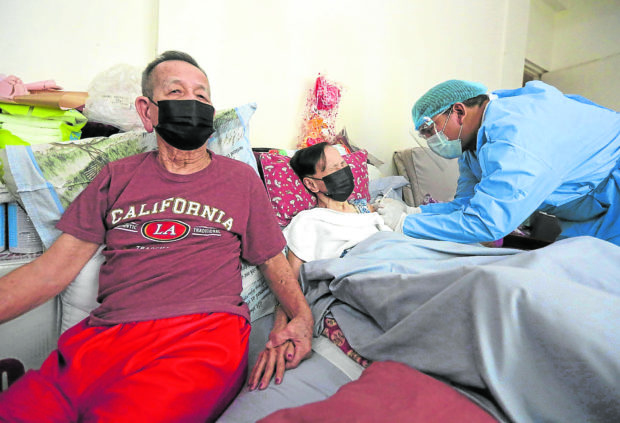WHO: Step up jabs for seniors

HOME SERVICE Holding each other’s hands, elderly couple Felicisimo and Natividad Pineda, both 91, receive their second dose of CoronaVac, the COVID-19 vaccine produced by the Chinese company Sinovac BioTech, in their house in Sta. Mesa, Manila, on Monday. The Manila Health Department is conducting home service vaccination to seniors and bedridden residents who cannot go to designated sites. —MARIANNE BERMUDEZ (file)
The World Health Organization (WHO) on Thursday called on the government to ramp up the vaccination of those aged 60 and above to protect them from another surge in COVID-19 infections due to the Delta variant.
In a virtual briefing with the National Commission of Senior Citizens (NCSC), Dr. Rabindra Abeyasinghe, WHO representative to the Philippines, said global evidence showed the likelihood of the Delta variant—the most transmissible to date—becoming the dominant strain, adding that it was “only a matter of time” before a community transmission takes place in the Philippines.
While he commended the government for imposing a travel ban and quarantine protocols for countries where the variant had been reported, Abeyasinghe said “we have no guarantee that we can indefinitely hold the Delta variant out … We have a window and we need to maximize what we are doing so that we save more lives.”
“If we fail to do that, it’s likely that we are going to see a lot of deaths happening among the senior citizenry,” he warned.
Unprotected
As the national vaccination program moves on to other priority groups, including economic front-liners and the indigent, the WHO official pointed out that a “large pocket” or around 75 percent out of 8.2 million senior citizens remain unprotected.
Article continues after this advertisementOnly 28.3 percent of the elderly, lumped under the A2 category, have received at least one dose of the COVID-19 vaccine as of June 28, he said.
Article continues after this advertisementData from the National Task Force against COVID-19 showed that 672,602 senior citizens were fully vaccinated or had received two doses as of June 27.Those aged 60 and above account for 60 to 70 percent of COVID-19 hospitalization and fatality rates in the country, according to the Department of Health.
“This is why we urge the government to use the limited vaccine supply in a rational manner (by) prioritizing the A2 group because, that way, we’ll save more lives, not if the surge happens but when the surge happens,” Abeyasinghe said.
He called it a “complex” situation when asked if the government might have moved on too soon to the other priority groups in its desire to reopen the economy, given the short shelf-life of vaccines and the low uptake during the initial rollout.
“But when you have a limited supply of vaccines, how do you maximize its impact? Certainly, vaccinating those economic front-liners is also important … but the maximum impact of the vaccines will come by prioritizing the senior citizens and the comorbid population,” he said.
NCSC chair Franklin Quijano said that 91 percent of the elderly were now willing to get vaccinated but the rest were still hesitant for various reasons. INQ